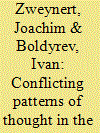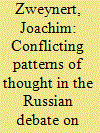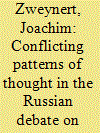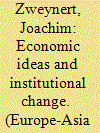| Srl | Item |
| 1 |
ID:
155306


|
|
|
|
|
| Summary/Abstract |
This article draws conclusions based on an analysis of the relationship between economic ideas and institutional change in Soviet and post-Soviet Russia, so far covering roughly the years from 1971 to 2007. It analyses the recent debate on economic modernisation in Russian economics. We argue that the relative failure of transition has to be seen in the context of a ‘failed transition of the mind’ and that the recent modernisation debate resembles the debate of the Brezhnev period.
|
|
|
|
|
|
|
|
|
|
|
|
|
|
|
|
| 2 |
ID:
076727


|
|
|
|
|
| Publication |
2007.
|
| Summary/Abstract |
After a paradigm shift in Russian economics around 1990, in the period 1992 - 2002 Russian economists increasingly returned to the path-dependent shared mental models that had prevailed earlier in their country. In particular, after the liberal reform concept seemed to have failed to solve the socio-economic problems of transition, the old debate between 'Westernisers' and Slavophiles was forcefully revived. The conflict between these camps has not yet been settled. This makes it difficult to predict the further development of Russia's economic and political order.
|
|
|
|
|
|
|
|
|
|
|
|
|
|
|
|
| 3 |
ID:
096239


|
|
|
|
|
| Publication |
2010.
|
| Summary/Abstract |
This article is a continuation of two essays by the same author on Soviet and Russian economic debates between 1987 and 2002 published in Europe-Asia Studies in 2006 and 2007. In the most recent phase of these debates, between 2003 and 2007, as in previous phases, the questions raised went far beyond the usual realm of economics. The questions raised included whether Russia should attempt to become a 'Western' country marked by democracy and a market economy serving the individual interests of its citizens or whether it was more important to become a great power again; whether Western patterns of political and economic life are suitable for Russia or whether the attempt to import foreign institutional structures is doomed to failure, making it necessary for Russia to find her own way. The discussion here is based on a qualitative content analysis of the most important economic journals and selected monographs.
|
|
|
|
|
|
|
|
|
|
|
|
|
|
|
|
| 4 |
ID:
070174


|
|
|
|
|
| Publication |
2006.
|
| Summary/Abstract |
The article analyses the shift in ideas that took place in Soviet economic thought between 1987 and 1991 and its relation to the changes in the real economy. The main focus of the article is on the issue of whether the evolution of Soviet economic thought in the analysed period changed in a gradual, path-dependent manner, or in a discontinuous, revolutionary fashion. Following the approach of Imre Lakatos, I argue that the conviction of being on the road to the 'wholesome society' formed the hard core of Soviet ideology, while 'democratic centralism' and the centralised economy provided its protective belt. Perestroika was the last attempt to save the hard core of Soviet ideology by adjusting the protective belt. This attempt failed, and the economic debates, which at first had been restricted to the protective belt, more and more approached its hard core, until it finally cracked. In this sense there was certainly a paradigm shift in Soviet economic thought. However, the notion of history as a purposeful process was not given up even by the Soviet adherents of monetarism. The utopian liberalism which became fashionable among Russian economists for a short period of time, it is argued, provides evidence that paradigm shifts and path-dependence in the evolution of economic ideas are not mutually exclusive.
|
|
|
|
|
|
|
|
|
|
|
|
|
|
|
|